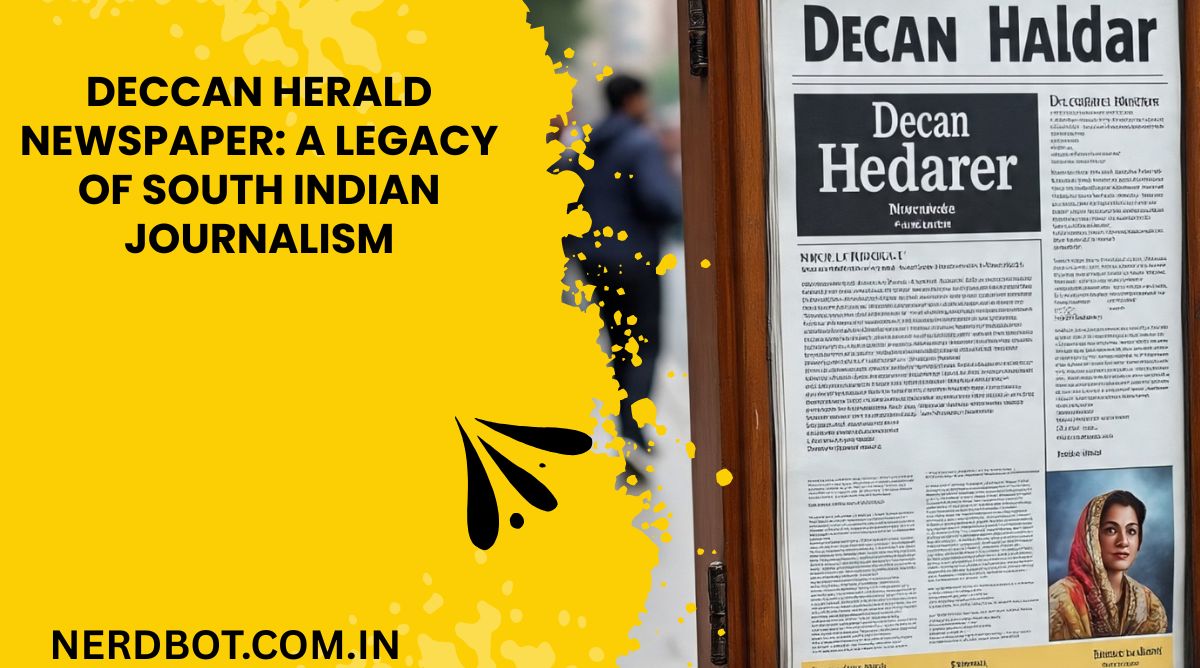In the diverse landscape of Indian media, few newspapers have stood the test of time while maintaining both quality and integrity. One such publication is the Deccan Herald, a respected English-language daily that has been a voice for South India since the mid-20th century.
From covering major political events to highlighting grassroots issues, the Deccan Herald plays a significant role in shaping public opinion and informing millions. This article takes a deep dive into the history, influence, editorial philosophy, and digital evolution of the Deccan Herald.
What is Deccan Herald?
Deccan Herald is a daily English-language newspaper published from Bengaluru, Karnataka, India. It is part of The Printers (Mysore) Private Limited, which also publishes Prajavani, a leading Kannada-language newspaper.
Founded in 1948, shortly after India gained independence, the Deccan Herald has carved out a niche for itself by focusing on the issues that matter most to South India, while also offering comprehensive national and international coverage.
A Brief History of Deccan Herald
Founded After Independence
Deccan Herald was established in 1948 by K. N. Guruswamy, a visionary entrepreneur and philanthropist. He founded the newspaper as part of his mission to contribute to independent India’s nation-building through responsible journalism.
At the time, there were very few quality English dailies that represented the southern perspective. Deccan Herald filled that gap, becoming an important voice for readers in Karnataka and other southern states.
Associated Publications
The newspaper is published by The Printers (Mysore) Pvt. Ltd., which also runs:
- Prajavani – A respected Kannada-language daily
- Sudha – A Kannada weekly magazine
- Mayura – A literary magazine in Kannada
The group has a strong tradition of bilingual journalism, ensuring wide regional engagement.
Editorial Philosophy and Content Focus
The Deccan Herald stands out for its balanced and ethical journalism. It avoids sensationalism and emphasizes factual reporting, making it a preferred choice for serious readers.
Key Content Areas:
- Politics and Governance – In-depth coverage of national and state politics
- Education and Youth – Features, career guidance, and updates on education policy
- Business and Economy – Focus on Indian economy, startups, and tech trends
- Science and Environment – Reporting on climate change, biodiversity, and scientific breakthroughs
- Culture and Arts – Coverage of literature, classical music, cinema, and regional art
Special Focus on South India
Unlike many English dailies that are North-centric, Deccan Herald pays special attention to the southern states—Karnataka, Kerala, Tamil Nadu, Andhra Pradesh, and Telangana.
It reports extensively on local governance, civic issues, regional festivals, and state-specific education and health policies, giving voice to regional narratives often overlooked in mainstream media.
Digital Expansion and Online Presence
With the rise of digital media, Deccan Herald has successfully expanded its reach beyond print.
Official Website
The Deccan Herald website (www.deccanherald.com) offers:
- Live news updates
- E-paper editions
- Opinion columns
- Multimedia content (videos, photo essays)
The online portal has helped the publication reach younger audiences, especially tech-savvy readers in Bengaluru and beyond.
Mobile App and Social Media
- Mobile App: Offers personalized reading experience, push notifications, and offline reading.
- Social Media: Active presence on Facebook, Twitter (X), Instagram, and YouTube with daily news bites and explainer videos.
Through these platforms, Deccan Herald reaches a global Indian diaspora, particularly in the U.S., U.K., and the Middle East.
Deccan Herald’s Role in Indian Journalism
Upholding Press Freedom
The publication has consistently advocated for freedom of the press, democratic values, and constitutional rights. Even during the Emergency (1975–77)—a time of press censorship in India—Deccan Herald maintained a measured but firm editorial tone.
Investigative Journalism
The newspaper is known for exposing corruption and bringing civic issues to light. From illegal land deals to public health violations, its investigative stories have led to policy changes and public accountability.
Opinion and Editorials
Deccan Herald’s editorial pages feature:
- Experts from diverse fields
- Guest columns
- Critical analysis of policy, economy, and society
It encourages intellectual debate and often highlights voices from the academic and activist communities of South India.
Challenges and Competition
Like many traditional newspapers, Deccan Herald faces challenges such as:
- Declining print circulation
- Digital advertising competition
- Shortened attention spans
It competes with national dailies like The Times of India, The Hindu, and Indian Express, as well as regional players. However, its strong editorial standards and hyper-local focus help it retain a loyal readership.
Deccan Herald vs. The Hindu
Both Deccan Herald and The Hindu are regarded as credible newspapers. Here’s a quick comparison:
| Feature | Deccan Herald | The Hindu |
|---|---|---|
| Founded | 1948 | 1878 |
| Region Focus | South India (Karnataka-based) | South India (Tamil Nadu-based) |
| Language | English | English |
| Known For | Balanced reporting, civic issues | In-depth national coverage |
| Parent Group | The Printers (Mysore) Pvt. Ltd. | The Hindu Group |
While The Hindu enjoys pan-India reach, Deccan Herald offers more state-specific depth, especially in Karnataka and the tech capital of India—Bengaluru.
Recent Innovations
Deccan Herald has made strides in adapting to modern readership demands:
- Podcast Series: Covering current affairs, politics, and culture
- Interactive Infographics: Especially in COVID-19 and election reporting
- Youth-Focused Columns: On entrepreneurship, career, and mental health
- Bilingual Publishing: Integrating select Kannada content to promote regional engagement
Why Deccan Herald Still Matters
In an age of clickbait and digital overload, Deccan Herald remains a bastion of credible journalism. For many readers, especially in South India, it is not just a news source but a trusted companion that reflects their concerns and celebrates their achievements.
The paper has retained its ethical voice while embracing new technologies and platforms, ensuring its relevance in the fast-changing world of media.
Conclusion
The Deccan Herald newspaper, with its roots in post-independence India, continues to be a powerful voice in Indian journalism. With its strong editorial principles, regional relevance, and digital adaptability, it stands out in a crowded media landscape.
Whether you’re a student preparing for competitive exams, a policymaker looking for ground reports, or a reader who values thoughtful journalism—Deccan Herald has something to offer you every day.









